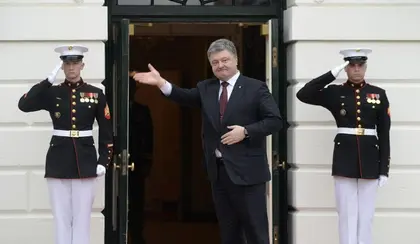Poroshenko’s response made waves in Ukrainian social media, with many people saying that the comments show that the president has lost touch with the reality.
“This is like the president giving himself up on charges of inadequacy,” Sergiy Fursa, an analyst with the Kyiv-based investment firm Dragon Capital, wrote on his Facebook.
JOIN US ON TELEGRAM
Follow our coverage of the war on the @Kyivpost_official.
Poroshenko issued a statement late on April 3 claiming that he was misinterpreted.
- See the most contemporary Ukraine news reports for today.
- Read the most current Ukraine news stories for today.
“Too bad that my words on the publication in the honorable New York Times were misinterpreted. I read this publishing house myself, and I do respect the stances by its editorial,” Poroshenko posted on Facebook. “I agree that in Ukraine we still have much to deliver, including on eroding corruption. And our first deliverables are already there. However I would emphasize that I have defended, and I will keep defending Ukraine at every possible stand.”
The New York Times editorial board published a piece called “Ukraine’s Unyielding Corruption” on March 31, as Poroshenko was participating in the Nuclear Security Summit in Washington, D.C.
The publication criticized Ukraine’s Prosecutor General Viktor Shokin, whose dismissal the parliament approved on March 29. The editorial calls Shokin “a symbol of Ukraine’s deeply ingrained culture of corruption,” and recounts how he failed to prosecute any allies of disgraced ex-President Viktor Yanukovych and was, instead, cleansing his office of reform-minded prosecutors.
“Alas, nothing is likely to change unless President Petro Poroshenko and parliament agree to install some real corruption fighters and approve serious judicial reform,” the New York Times editorial reads.
The authors of the editorial also called Poroshenko “a product of the old system,” who “seems to have accepted continuing corruption as the price to pay for a modicum of maneuvering room.”
“But the president, the prime minister and the parliament must be made to understand that the International Monetary Fund and donor nations, including the United States, cannot continue to shovel money into a corrupt swamp unless the government starts shaping the democratic rule that Ukrainians demanded in their protests,” the publication said.
The IMF, Ukraine’s key creditor, has earlier voiced concerns about “Ukraine’s slow progress in improving governance and fighting corruption.” The IMF postponed a $1.7 billion tranche to Ukraine until Ukraine is put “back on a promising path of reform.”
President Petro Poroshenko comments on the New York Times editorial during a press conference in Washington, D.C. on April 1.
A Ukrainian journalist asked Poroshenko about the editorial during a press conference in Washington, D.C. on April 1, and wanted to quote from it, but Poroshenko interrupted, saying that he was familiar with the article.
“I want to be clear. Today there is a hybrid war against Ukraine, (and it is conducted also) through the mechanisms of spreading of information that is damaging for Ukraine,” Poroshenko said.
He added that he planned to sit for a number of interviews with the Western media during his visit to the U.S., so that their audience would have a chance to find out what was really done in Ukraine in terms of fighting against corruption.
Many were surprised by the reaction of Poroshenko, who himself owns a media outlet in Ukraine, Channel Five.
“Ignoring an opinion of one of the most influential media in the world is not very clever, to say the least,” Mustafa Nayem, a lawmaker with the Poroshenko Bloc, wrote on his Facebook page. “This is sad. And alarming… Such failures in communication are the symptom of losing the touch with reality, a sin typical for previous Ukraine’s presidents.”
Kyiv Post staff writer Alyona Zhuk can be reached at [email protected]
You can also highlight the text and press Ctrl + Enter




